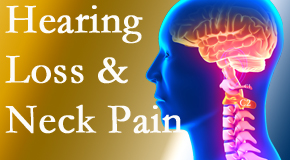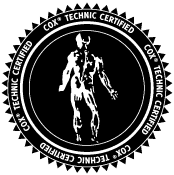Cervical Spine Related Hearing Loss and Neck Pain Relief with Chiropractic
The classic account of the first chiropractic adjustment by DD Palmer, the founder of chiropractic, details the hearing restoration of a deaf janitor after spinal manipulation. (1) So interesting! Today’s research reports help clarify and corroborate the connection of hearing and cervical spine pain issues. OrthoIllinois Chiropractic hears stories of improvement in McHenry chiropractic patients for issues not always related to the issue that brought them into OrthoIllinois Chiropractic for chiropractic care. Patients are elated! OrthoIllinois Chiropractic is excited for them. Let’s consider this side-effect of hearing loss improvement after chiropractic spinal manipulation.
THE HEARING AND CERVICAL SPINE CONNECTION
Hearing loss is not that rare with cervical spine problems. The relationship of cervical spine and hearing has been presented in the medical literature for years and years. In 1994, one author presented a discussion of the existence of a “vertebragenic hearing disorder” that accompanies with tinnitus, a feeling of ear pressure, otalgia and deafness due to functional deficit of the upper cervical spine. He tied issues like cervical vertigo and hearing disorders in 15% of patients with cervical spine issues and hearing losses of 5 to 25 decibels in 40% of them. (2) McHenry chiropractic patients report such conditions on occasion, so OrthoIllinois Chiropractic is not shocked at all.
Cervical spine issues can affect ear vessels and/or nerves causing hearing loss, vertigo or tinnitus. Cervical spine injuries can produce pain and limits in range of motion. The chance of hearing loss in patients with limited left rotation ability is high. Such hearing loss after a cervical spine injury is more common in men. (3) Further, there is evidence of interaction between the somatosensory and auditory brainstem structures, a pathway joining the cervical spine to hearing function. Researchers are working to find the pathway and understand better how spinal nerves like those of C2 (the second cervical spine segment) influence auditory responses (hearing). They have found projections from C2 dorsal root ganglion extending to the cochlear nucleus. (4) Patients who have Kimmerle’s anomaly – an anatomical variant of the first cervical segment (C1) – often experience chronic tension-type headaches and neurosensory-type hearing loss. (5) What does this say about the connection between hearing and the cervical spine? A connection. OrthoIllinois Chiropractic considers this when caring for McHenry cervical spine pain patients with a hearing loss or deficit.
CHIROPRACTIC HELP FOR McHenry HEARING LOSS RELATED TO CERVICAL SPINE ISSUES
Since that first chiropractic adjustment in 1895, chiropractic has recorded improvement for more patients with hearing issues. A study of 90 patients who experienced cervicogenic sudden hearing loss recorded that those who had chiropractic treatment in addition to routine medical care improved their hearing and alleviated their neck pain effectively after 10 days of care. (6) A case of hearing loss and tinnitus associated with cervicogenic neck pain in a female patient whose hearing and tinnitus were improved after having chiropractic spinal manipulation treatment. On a scale of 0 (no problem) to 10 (complete impairment), she rated her problems a 7 at the start of care and a 1 at the end of 5 months of care. An audiogram was normal, too. (7) These are satisfying outcomes that McHenry hearing loss patients could welcome! OrthoIllinois Chiropractic is up for the opportunity to help!
CONSIDER OrthoIllinois Chiropractic FOR RELIEF
Listen to this PODCAST about how Cox Technic eases cervical spine related neck pain and shoulder pain.
Schedule a McHenry chiropractic appointment to explore how OrthoIllinois Chiropractic may help ease cervical spine problems, neck pain and even potentially cervical spine related hearing loss.


